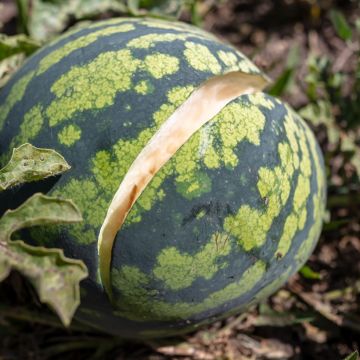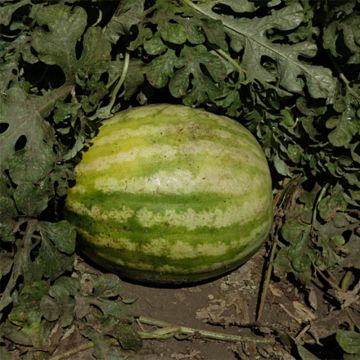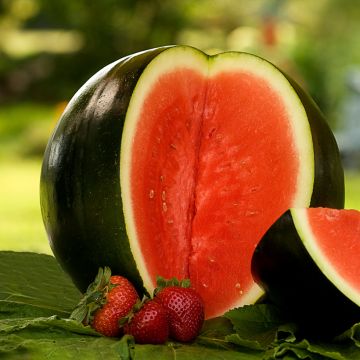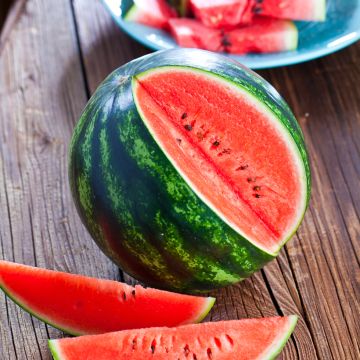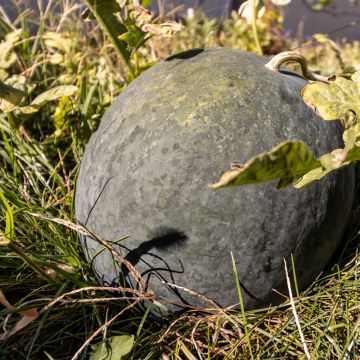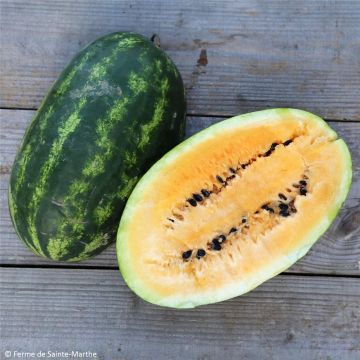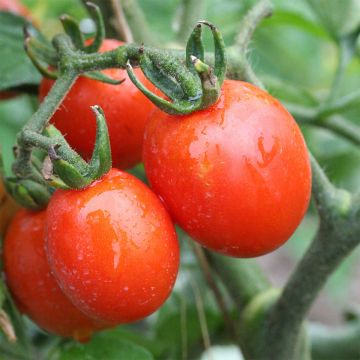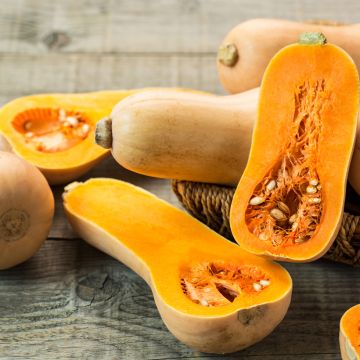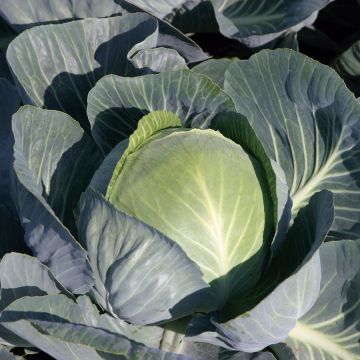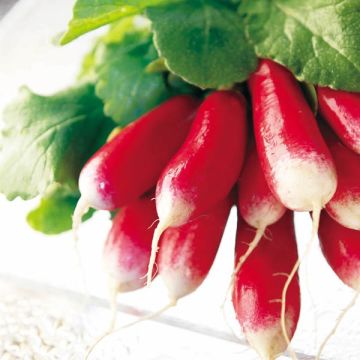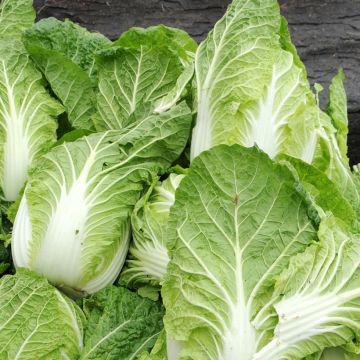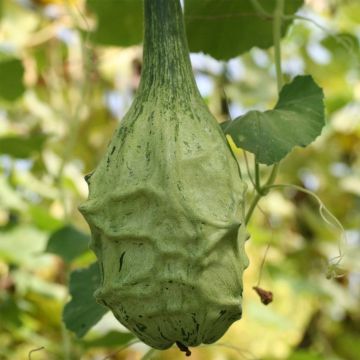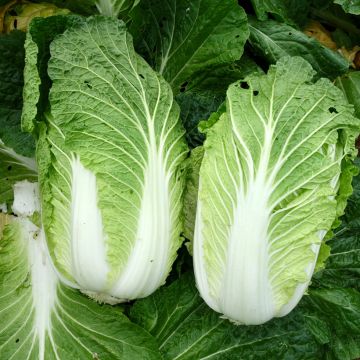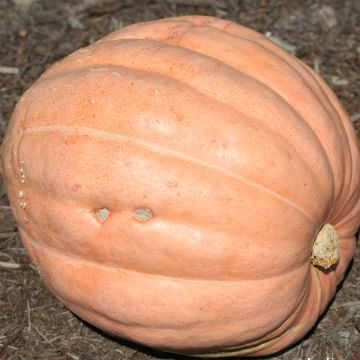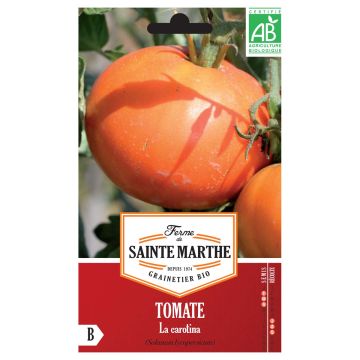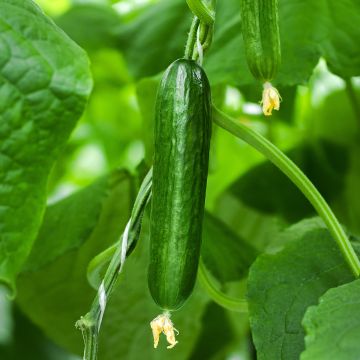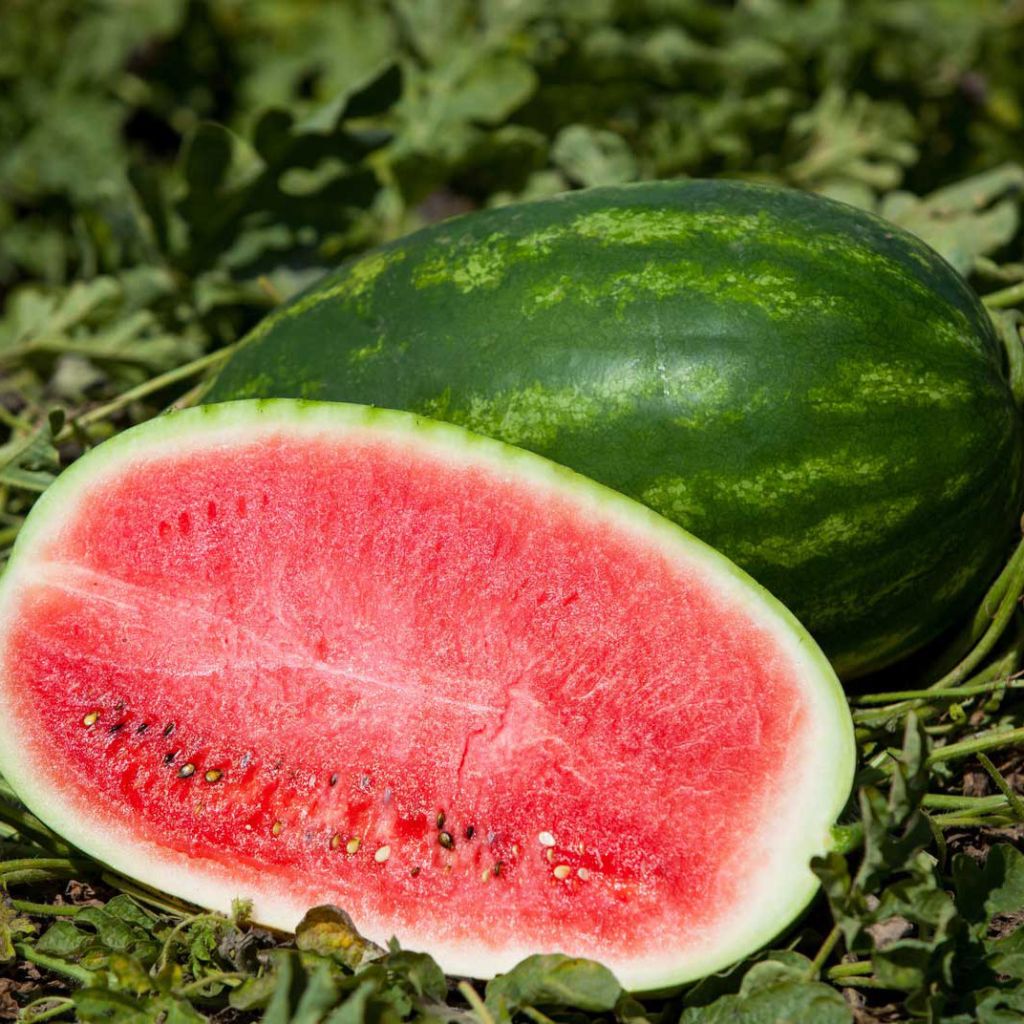

Melon d'eau Charleston Grey NT - Ferme de Sainte Marthe
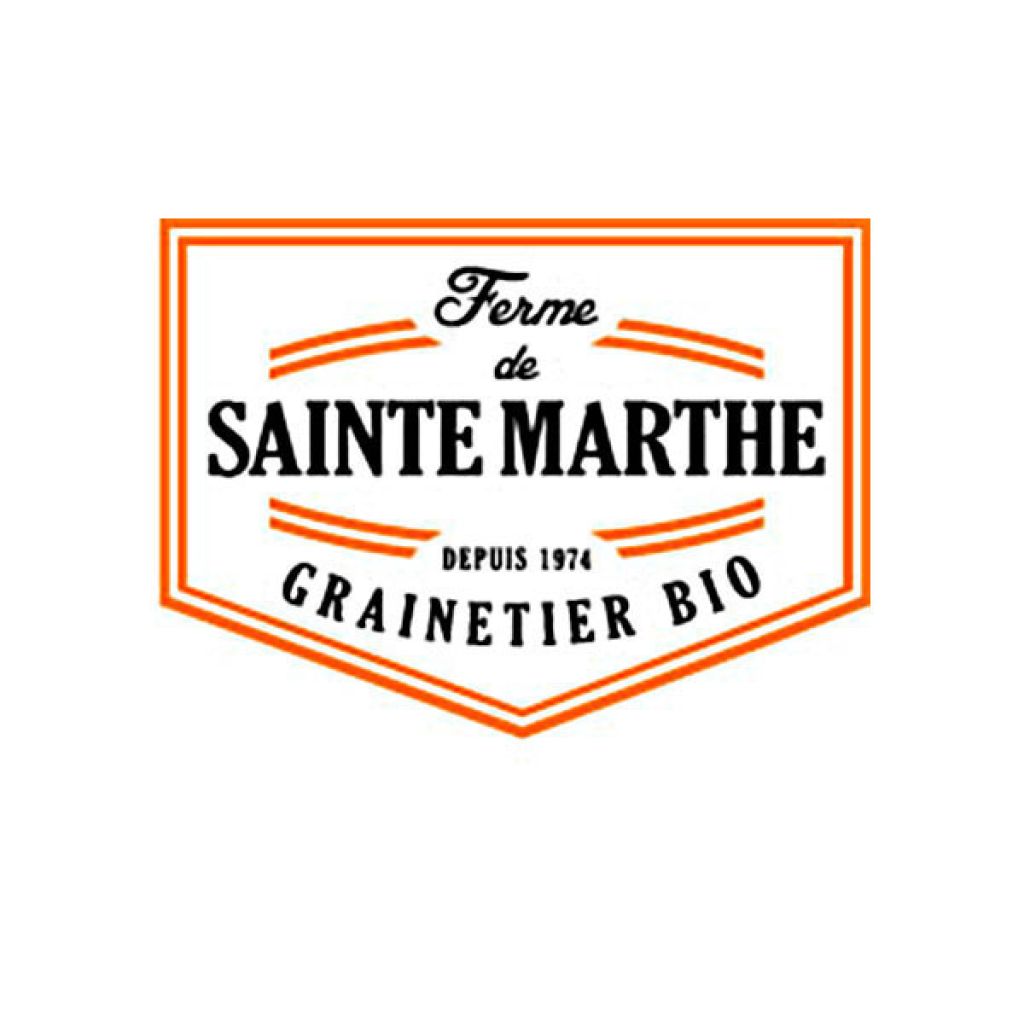

Melon d'eau Charleston Grey NT - Ferme de Sainte Marthe
Citrullus lanatus Charleston
Citrullus lanatus Charleston
Watermelon, Melon
Late due to the weather
jean françois lefour, 10/08/2016
Why not try an alternative variety in stock?
View all →This plant carries a 6 months recovery warranty
More information
We guarantee the quality of our plants for a full growing cycle, and will replace at our expense any plant that fails to recover under normal climatic and planting conditions.
Seed-only orders are dispatched by sealed envelope. The delivery charge for seed-only orders is €3.90.
Description
The Charleston Grey Watermelon, also known as Watermelon, is a heat and disease resistant variety. Very productive, its large fruits reach 12 to 15 kg. They have an oblong shape with rounded ends. Their skin is marbled green. Their flesh is dark red, firm, sweet, and juicy. Sow from March to May for a harvest from June to September.
Watermelon was cultivated before the Christian era in the Nile Valley, as evidenced by the frescoes in the tombs of the pharaohs. Watermelon fruits can be eaten raw, plain, salted, or sweet, just like melons. In hot regions, they are highly appreciated for their refreshing quality. They can also be used to make very good jam, cut into cubes with crushed ice or with various exotic fruits in fruit salads. Watermelon has anti-scorbutic and purifying properties, and contains vitamins (A, B, C) and minerals (calcium, magnesium, iron). Watermelon will require a supply of well-decomposed compost (3 kg/m²).
Harvest: Watermelons are harvested as needed. The watermelon is ripe when it "sounds hollow" and its stem dries up.
Storage: It can be stored for a few days in a cool place after harvest.
Gardener's tip: Regular hoeing and weeding are recommended, and mulching is advisable in case of drought.
Untreated or "NT" seeds come from plants grown conventionally (often with the use of pesticides), but they undergo no treatment after harvest. These seeds are allowed in organic market gardening when organic seeds are out of stock.
Report an error about the product description
Harvest
Plant habit
Foliage
Botanical data
Citrullus
lanatus
Charleston
Cucurbitaceae
Watermelon, Melon
South America
Annual
Other Watermelon Seeds
Planting and care
Sowing
The seeds are sown in buckets filled with potting soil, placed in a bright room or a greenhouse at over 20°C (68°F) for proper germination.
Place 2 or 3 seeds per bucket. When the young plants have a few leaves, keep only one plant per bucket. Plant the watermelon plants with their root ball in mid-May when there is no longer a risk of frost, in soil enriched with compost. Space them 1m (3ft) apart in all directions.
Maintenance
Watering should be abundant and frequent. Mulching the soil is beneficial. Hoeing and weeding are recommended.
Seedlings
Care
Intended location
-
, onOrder confirmed
Reply from on Promesse de fleurs
Vegetable seeds
Haven't found what you were looking for?
Hardiness is the lowest winter temperature a plant can endure without suffering serious damage or even dying. However, hardiness is affected by location (a sheltered area, such as a patio), protection (winter cover) and soil type (hardiness is improved by well-drained soil).

Photo Sharing Terms & Conditions
In order to encourage gardeners to interact and share their experiences, Promesse de fleurs offers various media enabling content to be uploaded onto its Site - in particular via the ‘Photo sharing’ module.
The User agrees to refrain from:
- Posting any content that is illegal, prejudicial, insulting, racist, inciteful to hatred, revisionist, contrary to public decency, that infringes on privacy or on the privacy rights of third parties, in particular the publicity rights of persons and goods, intellectual property rights, or the right to privacy.
- Submitting content on behalf of a third party;
- Impersonate the identity of a third party and/or publish any personal information about a third party;
In general, the User undertakes to refrain from any unethical behaviour.
All Content (in particular text, comments, files, images, photos, videos, creative works, etc.), which may be subject to property or intellectual property rights, image or other private rights, shall remain the property of the User, subject to the limited rights granted by the terms of the licence granted by Promesse de fleurs as stated below. Users are at liberty to publish or not to publish such Content on the Site, notably via the ‘Photo Sharing’ facility, and accept that this Content shall be made public and freely accessible, notably on the Internet.
Users further acknowledge, undertake to have ,and guarantee that they hold all necessary rights and permissions to publish such material on the Site, in particular with regard to the legislation in force pertaining to any privacy, property, intellectual property, image, or contractual rights, or rights of any other nature. By publishing such Content on the Site, Users acknowledge accepting full liability as publishers of the Content within the meaning of the law, and grant Promesse de fleurs, free of charge, an inclusive, worldwide licence for the said Content for the entire duration of its publication, including all reproduction, representation, up/downloading, displaying, performing, transmission, and storage rights.
Users also grant permission for their name to be linked to the Content and accept that this link may not always be made available.
By engaging in posting material, Users consent to their Content becoming automatically accessible on the Internet, in particular on other sites and/or blogs and/or web pages of the Promesse de fleurs site, including in particular social pages and the Promesse de fleurs catalogue.
Users may secure the removal of entrusted content free of charge by issuing a simple request via our contact form.
The flowering period indicated on our website applies to countries and regions located in USDA zone 8 (France, the United Kingdom, Ireland, the Netherlands, etc.)
It will vary according to where you live:
- In zones 9 to 10 (Italy, Spain, Greece, etc.), flowering will occur about 2 to 4 weeks earlier.
- In zones 6 to 7 (Germany, Poland, Slovenia, and lower mountainous regions), flowering will be delayed by 2 to 3 weeks.
- In zone 5 (Central Europe, Scandinavia), blooming will be delayed by 3 to 5 weeks.
In temperate climates, pruning of spring-flowering shrubs (forsythia, spireas, etc.) should be done just after flowering.
Pruning of summer-flowering shrubs (Indian Lilac, Perovskia, etc.) can be done in winter or spring.
In cold regions as well as with frost-sensitive plants, avoid pruning too early when severe frosts may still occur.
The planting period indicated on our website applies to countries and regions located in USDA zone 8 (France, United Kingdom, Ireland, Netherlands).
It will vary according to where you live:
- In Mediterranean zones (Marseille, Madrid, Milan, etc.), autumn and winter are the best planting periods.
- In continental zones (Strasbourg, Munich, Vienna, etc.), delay planting by 2 to 3 weeks in spring and bring it forward by 2 to 4 weeks in autumn.
- In mountainous regions (the Alps, Pyrenees, Carpathians, etc.), it is best to plant in late spring (May-June) or late summer (August-September).
The harvesting period indicated on our website applies to countries and regions in USDA zone 8 (France, England, Ireland, the Netherlands).
In colder areas (Scandinavia, Poland, Austria...) fruit and vegetable harvests are likely to be delayed by 3-4 weeks.
In warmer areas (Italy, Spain, Greece, etc.), harvesting will probably take place earlier, depending on weather conditions.
The sowing periods indicated on our website apply to countries and regions within USDA Zone 8 (France, UK, Ireland, Netherlands).
In colder areas (Scandinavia, Poland, Austria...), delay any outdoor sowing by 3-4 weeks, or sow under glass.
In warmer climes (Italy, Spain, Greece, etc.), bring outdoor sowing forward by a few weeks.

































